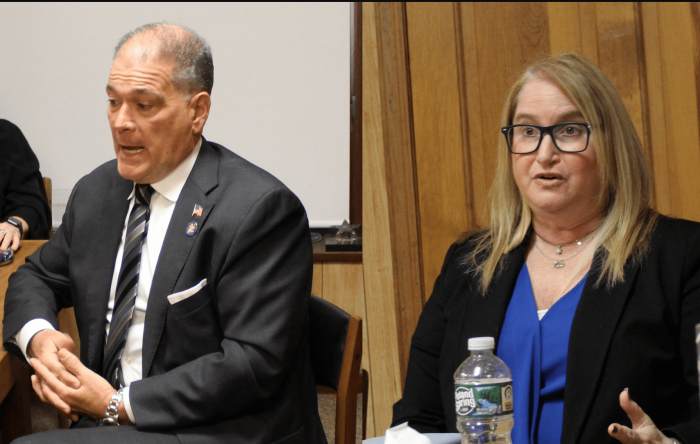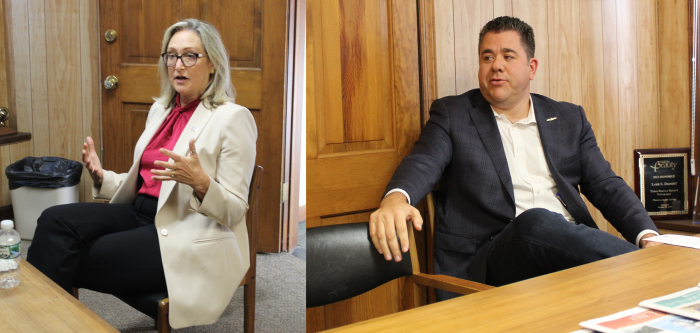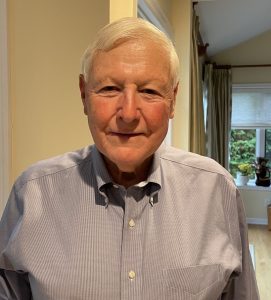Aiming for New York State senator in the 2nd District are incumbent Mario Mattera (R-St. James) and Democrat Susan Berland, formerly Suffolk County legislator in the 16th District and Town of Huntington councilwoman.
The two have worked together in the past on local issues, and despite differing on some political issues and eyeing the same job, the two remain friendly. When they stopped by the TBR News Media offices recently to discuss the race, the debate was a cordial one, and the two agreed on a few issues and were civil when they disagreed.
Currently, District 2 encompasses Smithtown and sections of Brookhaven and Huntington. Beginning in 2023, it will include all of Smithtown and Huntington and no Brookhaven hamlets.
Background
Berland was an attorney before becoming a town councilwoman in 2001. During her tenure as county legislator, she served as the majority leader of the Legislature. In 2021, she lost to Republican Manuel Esteban by 156 votes. When she heard Jim Gaughran (D-Northport) wasn’t going to run again for the state Senate after district lines changes, she said she decided to join the race.
A former union leader in the Plumbers Local Union No. 200, Mattera beat Democrat Mike Siderakis in 2020. The state senator is also a former board member of the Suffolk County Water Authority and has sat on Smithtown’s advisory board for new construction projects where he was active with the Lake Avenue Revitalization project in St. James.
Bail reform
Both candidates agreed that the current bail procedure is not working.
“It needs to be repealed,” Mattera said. “We need to get the proper people to the table.”
He added the proper people would be judges, district attorneys and law enforcement professionals.
The state senator said the problem lies in that many people who are released think they can get away with a crime again.
“If people know they can get away with it, they are going to keep doing it,” he said.
Berland said if she was a state senator when the bail-reform measure was passed in the state budget, she wouldn’t have agreed to it as it was written. She said she believes it should have been drafted more eloquently and more public relations should have been done to educate the public about it.
“I would not have voted for it in its current incarnation, but I would not repeal it,” she said. “I would amend it”
Berland said with people in the past being released on their own recognizance, in a way cashless bail has always existed. Regarding bail, she said unfortunately not everyone can afford it. In the last couple of years, she added she feels there have been improvements with amendments that have added judges back into the process and taken certain crimes off the bail-free list such as arson.
She thinks it’s important to have a judge’s discretion.
“I don’t want anyone selling drugs to kids by a school to be released on his own recognizance,” Berland said.
Both agree that such measures and amendments shouldn’t be tied to the budget, and policy decisions should be voted separately.
Drugs
The two candidates said they were against the legalization of marijuana.
Regarding the war on drugs, Berland said she felt Suffolk County has been successful with prevention and treatment programs and, if elected, would ensure municipalities received the resources they needed for treatment, prevention and education. She added it’s important to support the police.
“We need to give them the resources to investigate and recover the drugs that are out there,” she said. “I’m very much pro-police. I’ve always supported their budgets, their efforts.”
Mattera also said prevention programs are important in schools. He was upset about the marijuana legislation passing, and he feels marijuana is a gateway to other drug usage.
He said he is also worried when he sees or hears news stories that report children confusing THC gummies for candy because they are shaped like bears.
Mattera is proud that both Smithtown and Huntington opted out of dispensaries. The state senator met with supervisors over Zoom together to look into opting out of dispensaries, a decision that Smithtown Supervisor Ed Wehrheim (R) and former Huntington Supervisor Chad Lupinacci (R) strongly supported.
“I’m very concerned that we have drug dealers that were incarcerated that are the first ones who would be able to open these dispensaries,” he said.
Sewer installation
Both candidates are advocates for sewers in downtown business areas.
Mattera has worked on getting sewers in Kings Park, downtown Smithtown and St. James. He added sewering Route 110 is also important as it has been piecemealed in the past.
Berland pointed out Mattera voted against funding for sewers in Huntington when it was in the budget. He said there were other things in the budget which made it difficult to vote “yes.”
“That’s another thing where if you voted against the budget, and you’re voting against infrastructure money, where maybe there are things I think from the budget that Democrats or Republicans can agree on, and try to take some of those things out of the budget,” Berland said. “I don’t think anyone disagrees that we need infrastructure money.”
Berland said she supported the Suffolk County grant program for homeowners who wanted to install an advanced wastewater treatment system on their property.
“For people who can’t hook up to a sewage treatment plant, we want to be able to give them the money they need to put their individual systems in,” she said.
Education
Berland believes that schools need more resources to teach children the way they need to be.
“I don’t think children need to all be taught the same cookie-cutter way,” she said.
She believes in mainstreaming students, but also feels there may be a need for more teaching assistants in classrooms and breaking students into groups.
“One teacher to 25 kids in a classroom, I don’t think that really works anymore,” Berland said.
Mattera said mental health help assistance in schools is also vital, especially after the pandemic. He noticed that with his own children, they were excited to stay home at first during the early days of the pandemic, but the excitement soon faded. He worked to get students back to “normalcy” such as back in the classrooms for in-person teaching and taking part in their usual activities such as sports and proms.
Despite the obstacles COVID-19 presented, Mattera said, “Our school districts did a great job, and I commend all of our teachers.”
Both are proponents of BOCES programs available to students with training young people for the careers in the trades.
Reproductive rights
Mattera is endorsing Congressman Lee Zeldin (R), and Berland is voting for current New York State Gov. Kathy Hochul (D) in the governor’s race.
Berland is afraid that Zeldin will repeal rights to an abortion in New York, and she feels that Hochul is the only gubernatorial candidate that will protect a woman’s right to choose, a decision she feels should be made among a woman, her family and doctor.
“Our reproductive rights and our rights in general are only as safe as the people who are sitting in the offices that make those decisions,” Berland said. “I would absolutely protect a woman’s right to choose.”
Mattera believes after speaking with Zeldin, that the latter will follow through on his promise not to overturn state law regarding abortion, and he himself would not vote to do so either. The state senator said his feelings on abortion is that it should be available if the pregnancy is a risk to a mother’s health or in the case of incest or rape, and if the woman is in the first trimester. He said if nothing’s wrong in the second or third trimester he has problems with a woman getting an abortion at that point.
Hochul v. Zeldin
In addition to reproductive rights in the state, regarding voting for governor, Mattera also had an issue with health care workers losing their jobs if they weren’t vaccinated, which was a measure Hochul passed.
He added he feels the governor has not dealt with the recent migrants to NYC.
“What are they doing about all these people who are coming into New York state,” he said.
He added the “vibrant city” is going to get worse, and he wonders why the governor isn’t dealing with the issue.
He said there needs to be a process for migrants especially with recent drug problems.
Berland disagreed and believes Hochul has done a good job since taking over office after former Gov. Andrew Cuomo (D) stepped down.
“As a woman in government for 20 years, I see the difference in how women govern than men,” she said. “When there’s an issue that comes in front of her, she’s looking outside the box, she’s looking to try to fix those issues. There isn’t a single issue that she’s avoided since she started, that she got thrown in. And I think she’s hit the ground running.”














